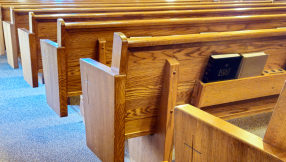
In the latest advance of the LGBTQ movement earlier this week, Swiss voters decided in a referendum to back hate speech legislation making supposedly 'homophobic' speech a criminal offence.
In an ironic and intellectually fraudulent move, Swiss government authorities assured voters that even though free speech is being curtailed it is not actually a curtailment of free speech, which according to the Swiss is an inviolable principle.
In other words, they say that although there is speech which will carry criminal sanctions, this is not a limitation of free speech.
The Bible makes clear that we should watch our words even as we guard our hearts. Under no circumstances should Christians use any expression that would be theologically defined as hateful speech. Today, however, a traditional defence of biblical Christianity can be defined by secularists as hate speech and, as is the case now in Switzerland, as a criminal act.
Switzerland has long represented a certain form of staid, even stuffy, social conservatism. That's not necessarily because of its strong theological traditions: its conservatism derives from the stability engendered and required by large financial institutions. Geneva has long abandoned the faith of Calvin, Farel, Beza and Knox. Switzerland's Reformed Church even backed the new law.
As has been experienced elsewhere, the new law will lead to an inevitable stifling of debate and restriction of democratic freedom. At present same-sex marriage is still not recognised in Switzerland, but there is legislation moving through parliament to legalise same-sex unions. What will be the impact of the hate speech legislation when upholders of normal marriage enter into the national debate whilst rejecting same-sex marriage?
Will speaking against the legalisation of same-sex marriage be an act of public homophobia worthy to be criminalised? How clearly can biblical Christians express their opposition without falling foul of the law? Even with the firmest assurances, there will still be an amount of self-censorship on the part of Christians, just in case.
The Swiss say that the church needn't worry because religious liberty will still be recognised. Even if there are explicit protections for religious speech or religious institutions, and individuals speaking from religious conviction, we can be confident those exemptions will not last long. The logic of this legislation is to declare that anything short of total acceptance of the LGBTQ movement's aims is open to interpretation as a form of hatred.
Non-compliance with the prevailing sexual norms is seen as rooted in a brilliant propaganda term, 'homophobia'. Anything short of endorsement of same-sex marriage and the ever-expanding assortment of issues included in 'LGBTQ' is viewed as emerging from an entrenched psychiatric or psychological fault.
We must acknowledge that this is a superb political manipulation of language. Take those who oppose you and by skilful creation of neologisms implant in the public consciousness the belief that any opposition is motivated not by an authentic difference in worldview, or a form of legitimate religious conviction, but rather by something disordered and somewhat sinister. Anyone who opposes the predominant progressive culture is understood to be weird, even deranged and in need of treatment.
The BBC reports that 'there was opposition from some religious groups,' and managed to downplay that opposition as coming from rednecks in the sticks: 'The Swiss Evangelical Alliance, which has significant support in rural areas, was sceptical.'
Marc Jost, general secretary of the Swiss Evangelical Alliance, whose own father has come out as a homosexual and is in a civil partnership, said in a conciliatory statement: 'Our churches see the marriage of a man and a woman as the only couple they want to marry. We just want to be free to say, "Okay, we want to privilege the marriage of a man and a woman". And we don't want to be at risk if we share this opinion, and treat other couples in a different way.'
Jost expressed concern that he and fellow evangelicals are at risk if they articulate the historic Christian biblical understanding of sexuality, especially when it comes to homosexuality and the question of marriage and beyond that the question of gender, and whatever else is in line to be the next progressive sexual cause.
The Swiss interior minister has said that free speech will still be allowed and respected so long as that speech does not injure another's human dignity. The problem is, who is going to decide whether or not a statement injures another's human dignity? We all know how fragile the dignity of the LGBTQ community can be.
Christians must understand that this directly impacts what the church teaches and preaches on the basis of the Word of God. Our experience in Britain shows that it will lead very quickly to efforts to silence individual Christians in the public square, especially in corporate life, all branches of education and areas of public service, from speaking on the basis of that citizen's own Christian convictions.
Christians have to accept that we are non-conformists in a world that increasingly demands conformity to non-Biblical standards.
Campbell Campbell-Jack is a retired Presbyterian minister. He blogs at A Grain of Sand.













